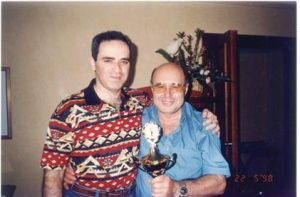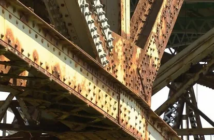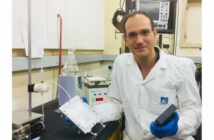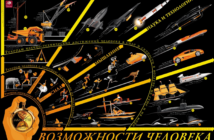Еженедельная независимая газета «Новости недели» (newspaper “News of the Week”) № 4740, 01.09/2016 – 07.09/2016, Израиль.
PERSONALITY
Bella KERDMAN
THE FIRST AND ONLY ONE
The first and only Israeli to be-come a member of the International Academy of Engineering (at least the only one so far) is Doctor of Technical Sciences Isak Lopatukhin.
We have known each other for nearly twenty years. Once I received a large envelope with copies of old pic-tures and documents plus clippings from some Russian-language publica-tions. The envelope was also old and worn-out. Judging by the date of dis-patch, it traveled along the routes of the Israeli mail more than four years! The content urgently called for a trip: it opened a window on a voluminous Jewish history of two families: the Lopatukhins and the Nikomarovs. I found them at a new address, which differed from the one on the envelope, and went to meet them in Nazareth Illit. I named the article, which was pub-lished in the News of the Week in March 2001, «What do you have, olim, in your luggage? «.
But what was there in the luggage of descendants of two eminent Jewish families – Bella Nikomarov, a Candi-date of Technical Sciences, and her husband Isak Lopatukhin, a Doctor of Technical Sciences? What did they take with them in their exodus from Baku, where they were born, achieved success, and brought up their two chil-dren? In their three-room «amidar» apartment, I was struck with an abun-dance of books: five thousand volumes of technical and scientific literature, which these well-mannered people had sent by parcel post or brought with them! What else? They took a draw-ing board of Bella’s father, Gregory Markovich Nikomarov, an honorary plumber of Baku, winner of the USSR Council of Ministers Prize for the de-sign and construction of the Samur-Divichi canal and water purification fa-cilities at the Jeyranbatan reservoir. This board was in a working condition, it was clearly being used. The luggage also contained an old prayer book, which once belonged to Isak’s grandfa-ther. I was further surprised with relics that had come to Baku repatriates from the Kola Peninsula: small but heavy granite rounds from an extra-deep borehole. Isak Lopatukhin, it turned out, traveled there in January 1983 in order to see the operation of slips dur-ing the descent and ascent of a drill string whose designers used a method of calculation based on a formula that he, the professor, had developed. At that time, the drillers in Kola surpassed the depth of capture attained by their US colleagues.
Isak, Bella and their two chil-dren — Mark and Larissa — arrived in Israel in late 1991. The father of the family was then 57 years old, the mother – 52; their relatives from earlier waves of aliyah were already here. Isak, a graduate of the Azerbaijan Polytechnic Institute, who defended his candidate’s and then doctoral theses in Moscow, and Bella, who graduated from a petrochemical college in Baku and specialized in waste water treat-ment, in which field she defended her thesis, understood that finding em-ployment in science at their age was problematic. The wise Bella decided that the priority was to realize the sci-entific potential of her husband. She began to earn money by taking up an occasional «nikayon» while making it a commitment to help Isak with transla-tions of his books and articles into He-brew, which she mastered easily and promptly, and into English. For exam-ple, they jointly translated the book «In-troduction to Dimension Chain Calcula-tion Theory in Assembly and Technol-ogy in Machine Production» into He-brew and typed it on a computer. This work was published by a print shop af-filiated with the Technion in Haifa, after which the couple took up a large three-volume book named “Fundamentals of Machine Construction Technology”.
Isak Majorovich Lopatukhin, as it turned out, does not like the term «scientist» and prefers «specialist». He was always attracted to the solution of specific technical problems. And once he found a solution, he always wanted to check it in practice, often with his own hands. Soon after his arrival, just after graduating from an ulpan, Isak began looking hard for a job. A plant in Carmiel offered him a test in the calcu-lation and technology of production of gyroscope parts. He elegantly solved this problem but the plant did not offer him a job. The manager rec-ommended that with such knowledge he should join the Technion. In order to solve practical problems, he also put to use his knowledge and experience in the field of diamond cutting. Some of his recommendations were published in the article «Analysis of diamond saw-ing process” in «The International Jour-nal of Advanced Manufacturing Tech-nology» (London).
I.M. Lopatukhin really won his place at the Technion. He discusses his relations with the university with gratitude to his local colleagues and with a touch of self-irony. In 2001, he began working at the Technion as a volunteer, received a separate room, and started to write books and direct student projects. However, the profes-sor has never received the so-called «tenure». «Nevertheless, I have achieved here more than I could if I stayed there during these years!» Isak Majorovich says.
Professor Lopatukhin is, as they say, a natural-born mechanic and technologist. Upon finding out that in Israel, including the Technion, technol-ogy did not get enough attention, he started to «load» his students, future engineers, with knowledge in this area. Colleagues appreciated such contribu-tion to the training of specialists. In April 2014, Dr. Lopatukhin received a special certificate in recognition of his services: «The faculty proudly congrat-ulates you in recognition of your exten-sive and years long contribution in ed-ucation and training of generations of engineers in the field of machine-production technology». This document was signed by Professor Pinchas Bar-Yosef, Dean of the Faculty of Mechan-ical Engineering at the Technion.
Isak specified that he had re-ceived the certificate for five books written for Israel, in which he used as sources his lectures given during his time at the Azerbaijan Polytechnic In-stitute, technical literature, materials from his own theses and theses of his graduate students, Israeli technical lit-erature and so forth. He set out the material concisely, in the form of lec-tures. It is just 670 pages long in He-brew. On his own, the prepared hun-dreds of drawings and input hundreds of formulas on his computer. One of these five books was also published in English. Four books were published in Russian, and his cherished Bella trans-lated them into Hebrew; only thanks to her were they published in the lan-guage of the Nation.
Yes, unfortunately, not every-thing in this beautiful Jewish family has turned out well in their ancestral home-land. It is hard to write about it, but it is impossible to be silent. Alas, the family has been reduced by half: an incurable disease took the life of Bella, and a few years later – that of Mark. Lopatukhin Junior, like his father, was a true engi-neer. He successfully realized its po-tential in the profession, started a fami-ly where children were born, and en-thusiastically engaged in the search for the roots of his large clan. And oh, such a tragedy! The father said a Kaddish over the grave of his son — what could be worse than this grief? «In order not to cry, I fill my time with work», — wrote Isak, informing me of the death of Mark, who at the time was my first point of acquaintance with this family.
The significant work of Isak Majorovich Lopatukhin has been no-ticed and appreciated. He was hon-ored with a listing in the 29th edition of the international directory Who’s Who in the World (2012). I have in front of me a message of the publication committee of the Directory attesting to this fact. The message states that “in-clusion in which is limited lo those indi-viduals who have demonstrated out-standing achievement in their own fields of endeavor and who have , thereby, contributed significantly to the betterment of contemporary society”
And now another recognition of the scientist and engineer: Isak Lopatukhin became a full member of the International Academy of Engineer-ing! A letter of recommendation ad-dressed to the election committee of the Academy, which conducted its regular selection, from Professor M. Shpitalni, Deputy Vice President for Academic Affairs of the Technion, stated as follows:
“I enthusiastically and whole-heartedly support the nomination of Dr. Isak Lopatukhin (USSR D.Sc) USSR Professor to the rank of full member of the International Academy of Engineer-ing. Dr. Lopatukin has been a corre-sponding member of the International Academy of Engineering since 2000.
I first met Dr. Lopatukin when he joined, as a researcher supported by the Ministry of Absorption, the Ullman Center for Manufacturing Sys-tems and Robotics at the Technion (Is-rael Institute of Technology) in the Faculty of Mechanical Engineering.
Based on his success we offered Dr. Lopatukhin to continue his scientific work at the Technion.
Since then I follow his scientific work and because his fields of interest are close to mine, I feel comfortable to evaluate his achievements. So, I have had the opportunity to witness firsthand Lopatukin’s dedication to manufactur-ing education and his exceptional per-sistence to advance the state-of-the-art related to the design of machinery (machine tools) as well as manufactur-ing in general. His work on tolerances are rated first class. These are all sup-ported by his CV including the publish-ing of books and scientific paper and of course professional research reports.
Dr. Lopatukhin is one of the leading manufacturing researchers immigrated to Israel. He has published around 140 articles in the machinery and manufacturing areas. He holds 10 patents and published books that have filled an existing gap in that it provides the state-of-the-art information needed to prepare students for industry and to keep engineers up to date on the latest developments in the field.
In summary, Dr. Lopatukhin has made significant contributions to manufacturing education, to research and to the manufacturing industry. I believe that due to his major impact on the field he is highly deserving of be-coming a full member of the Interna-tional Academy of Engineering.
It is for this reason I enthusiasti-cally support his nomination for the award.
In conclusion, a brief interview with the professor:
— Isak, tell us, at least in general terms, of the International Academy of Engineering — it is unlikely to be known to the general reader.
— In the former Soviet Union, we, engineers, had a professional acade-my, we knew about it. In the late ’90s, engineering academy of CIS countries were formed on its basis, and they be-came the founders of the International Academy of Engineering (IAE), which now has nearly 1,300 members from 40 countries. It has consultative status with UNIDO – the United Nations In-dustrial Development Organization. Areas of IAE activity are driven by the specifics and needs of the spiritual, economic, scientific and technological development of each of its member states.
— Is there a branch of the IAE in Israel?
— Not yet. However, there is an interest in organizing it. I received a draft agreement but the Technion management does not want to take on this burden. We need to find a body in Israel that will take up this work, which is important and useful for engineering personnel in our country.
— Let us hope that such a body materializes. It remains to wish you, Isak, to continue to keep it up in this life, which has taken such a dramatic turn for your family.
Иллюстрация: mkisrael.co.il
Translated into English by Simon Vigdorchik, Ph.D (USA).
General editing of the translation by Mr. Alexey Serebrennikov (USA and Russia).
Еженедельная независимая газета «Новости недели» (newspaper “News of the Week”) № 4740, 01.09/2016 – 07.09/2016, Израиль.











